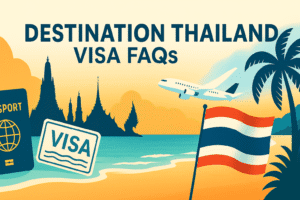The Destination Thailand Visa (DTV) is a newly announced visa designed to support the government’s efforts to increase tourism in Thailand. It provides an incentive to foreigners that work remotely, colloquially referred to as “digital nomads”, to stay and work in Thailand for extended periods without immigration or tax concerns.
If you successfully acquire a DTV, you will be rewarded with a 5-year multiple-entry visa and the right to stay in Thailand for a total of 180 days a year, with an option to extend for another 180 days. This is the perfect kind of visa if you’re looking to experience the Land of Smiles as a remote worker and earn income without the many restrictions and drawbacks of standard tourist visas.
How Much Does a Thailand DTV Visa Cost?
The Destination Thailand Visa costs 10,000 THB.
Eligibility Requirements for the Destination Thailand Visa (DTV)
While details regarding how to apply for a Destination Thailand Visa are still pending, some information on the requirements you need to fulfill has already been released. You need to meet the following eligibility requirements for the visa (subject to change):
- You must be at least 20 years old.
- You must have enough money to pay for the visa fee.
- You must prove that you possess at least 500,000 THB in your bank account to support your stay in the country.
- You must provide proof of employment with a registered company.
If you’re a remote worker or digital nomad looking to maximize your journey while also having the option to work during your stay, the Destination Thailand Visa is created specifically for you. It is also a perfect fit if you are visiting Thailand to participate in the following activities:
- Muay Thai
- Thai cuisine
- Education and seminars
- Sports
- Medical treatment
- Foreign talent
- Events related to art and music
Benefits of a Thailand DTV Visa
These details are also not fully confirmed, and are subject to change:
- The income requirements and visa fees are lower for Thailand compared to other Southeast Asian countries offering similar visas.
- You can extend the visa once for up to 180 days which costs you 10,000 THB.
- A total of 93 foreign nationalities are eligible for the DTV Visa Thailand.
- This visa allows you to legally work remotely while in Thailand for international companies and clients.
- You can bring along your spouse and any children below the age of 20.
- As the visa lets you stay up to 180 days in Thailand, you won’t need to pay any taxes on income derived from foreign sources.
Downsides of a DTV Visa Thailand
- While you can perform certain activities and earn income, you cannot work for a Thai company requiring a Thai work permit.
- If you want to change the type of visa you’re on, this will terminate your DTV.
No release date or information on how to apply has been announced for the visa yet, though more news will be coming in late June or early July, 2024. It is highly likely that you will be able to apply for it through a Royal Thai Consulate, a Thai Embassy, or the immigration office in Thailand.
How to Apply for the Destination Thailand Visa DTV
The application journey and other details of the Destination Thailand Visa (DTV) are still yet to be released to the general public, so return to this website regularly or contact us at Siam Legal for up-to-date insights on any incoming news. We can share advice on how to complete your application, determine whether the visa is the right fit for you, and ensure you can make an informed choice about your future in Thailand.








































